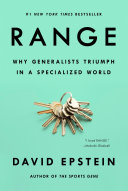

David Epstein's 'Range: Why Generalists Triumph in a Specialized World' challenges the conventional wisdom that specialization is the key to success. Through a wealth of research and compelling narratives, Epstein illust...
Continue readingIn a world that often champions specialization, David Epstein argues for the advantages of being a generalist. Generalists, who have a wide range of experiences and knowledge across various fields, are better equipped to...
Continue readingEpstein discusses the importance of experimentation in learning. He contrasts the 'kind' learning environments, where patterns are clear and outcomes predictable, with 'wicked' learning environments, where the rules are ...
Continue readingOne of the central themes of 'Range' is the significance of diverse experiences in shaping successful individuals. Epstein argues that varied experiences not only enhance creativity but also provide a broader skill set t...
Continue readingWhile Epstein acknowledges the importance of deliberate practice in achieving mastery, he argues that it is not the only pathway to success. He points out that in many fields, particularly those that are complex and unpr...
Continue readingEpstein champions interdisciplinary thinking as a powerful tool for innovation and problem-solving. He argues that many of the most significant breakthroughs come from individuals who can bridge gaps between different fi...
Continue readingEpstein warns against the dangers of over-specialization, particularly in a world that is increasingly complex and interconnected. He argues that specialists may struggle to adapt to changes and new challenges because th...
Continue readingIn the context of the future of work, Epstein discusses how the rapid pace of change in technology and society necessitates a shift in how we approach education and career development. He argues that traditional models o...
Continue readingThe reading time for Range depends on the reader's pace. However, this concise book summary covers the 7 key ideas from Range, allowing you to quickly understand the main concepts, insights, and practical applications in around 20 min.
Range is definitely worth reading. The book covers essential topics including The Value of Generalization, Learning and Experimentation, The Importance of Diverse Experiences, providing practical insights and actionable advice. Whether you read the full book or our concise summary, Range delivers valuable knowledge that can help you improve your understanding and apply these concepts in your personal or professional life.
Range was written by David Epstein.
If you enjoyed Range by David Epstein and want to explore similar topics or deepen your understanding, we highly recommend these related book summaries:
These books cover related themes, complementary concepts, and will help you build upon the knowledge gained from Range. Each of these summaries provides concise insights that can further enhance your understanding and practical application of the ideas presented in Range.